World
Out in the World: LGBTQ news from Europe and Asia
Tbilisi Pride in Georgia has cancelled all physical Pride events this year

GEORGIA
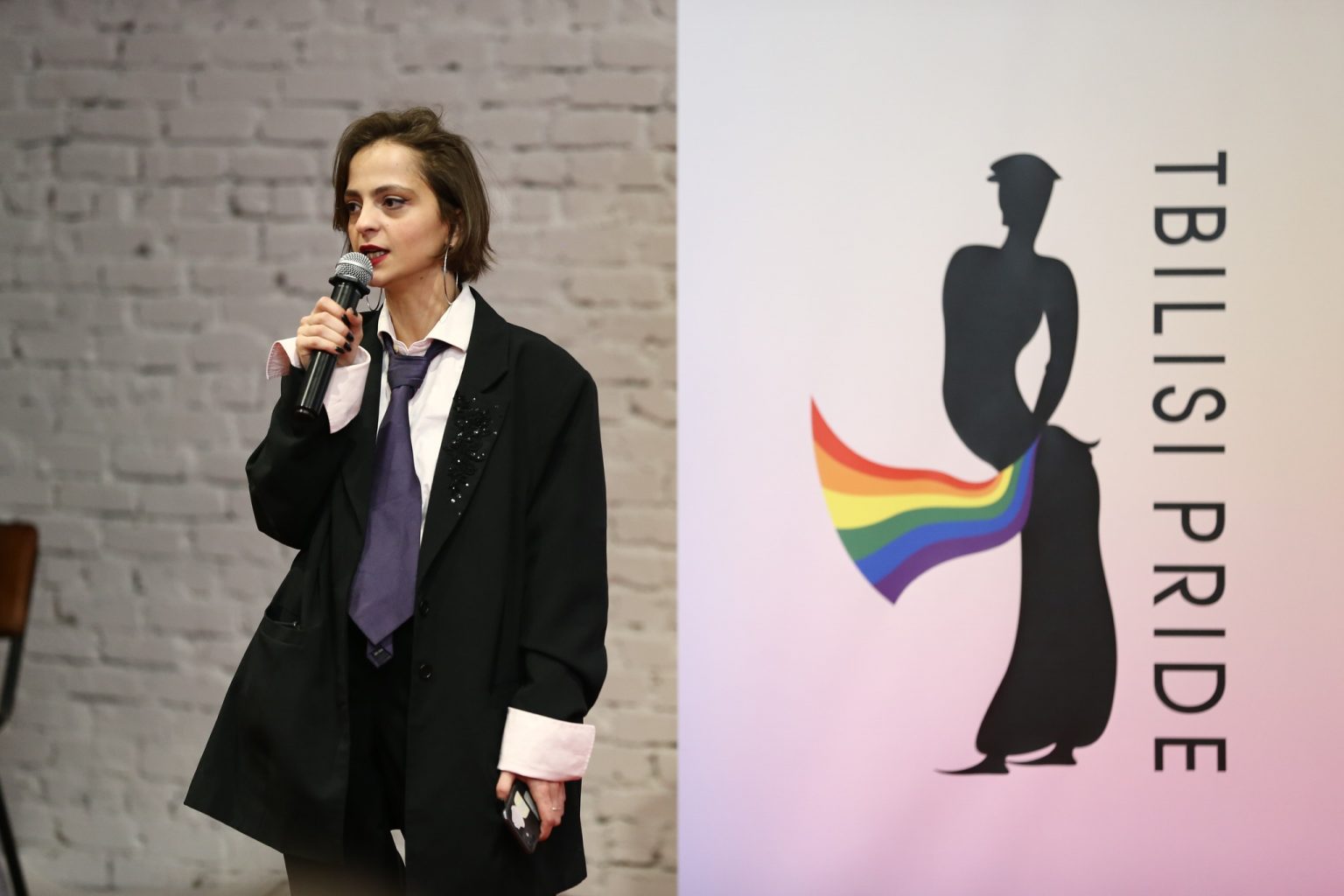
The organization that holds Pride events in the Georgian capital Tbilisi has announced it is cancelling all physical Pride festivities this year, in light of an increasingly hostile environment promoted by the Georgian government ahead of elections this fall.
Tbilisi Pride says in a statement posted to Facebook that they will focus their efforts instead on reaching hearts and minds, with a hope of defeating the government and ending restrictive legislation in the October election.
“We anticipated that the summer before the 2024 parliamentary elections would be filled with physical violence encouraged by the government and rhetoric filled with hate and hostility,” the statement says.
“Now, after ‘Georgian Dream’ adopted the Russian-style law on ‘foreign agents’ and announced a hate-based anti-LGBTQ legislative package alongside constitutional changes, we are even more confident in our decision. We are demonstrating the highest civic responsibility and recognize that the fight for queer rights today is inseparable from the broader people’s struggle against the Russian-style regime. This fight will inevitably end in favor of the people on Oct. 26!
We will use the coming months to bring the message of queer people to more hearts than ever before! We will explain to everyone that homophobia is a Russian political weapon against Georgian society, against the statehood of Georgia! We are patriots of this country and will always and everywhere be where our homeland calls us!”
The U.S. government slapped visa restrictions on members of the Georgian government in response to actions taken to undermine democracy in the post-Soviet nation, just as the government announced a sweeping package of anti-LGBTQ legislation it intends to pass ahead of fall elections.
State Department spokesperson Matthew Miller told a June 6 press conference in Washington that the government had slapped sanctions on “between two and three dozen” individuals who were “responsible for or complicit in undermining democracy in Georgia, such as by undermining freedoms of peaceful assembly and association, violently attacking peaceful protestors, intimidating civil society representatives, and deliberately spreading disinformation at the direction of the Georgian government.”
Citing U.S. privacy law, Miller refused to name any individuals who had been sanctioned. He added that this was considered a “first tranche” of sanctions.
Georgia has been rocked with protests for weeks in response to the “foreign agents” law, which requires media and civil society groups to registers as agents of a foreign power if they receive funding from abroad.
The law was passed by the ruling Georgian Dream Party, vetoed by the president who is a member of the opposition, and then passed with a veto override on May 28.
Modeled after a similar law in Russia, the law is meant to undermine the credibility and actions of bodies that are critical of the government and has drawn fierce criticism from Georgia’s allies in the U.S. and European Union.
Georgia was recognized as a candidate country from EU membership this year, but EU leaders have warned that the law undermines European values and threatens membership negotiations.
At the same time, the Georgian government has introduced a package of anti-LGBTQ legislation also modeled after Russian laws, which it is hoping will fire up its base and divide the opposition ahead of fall elections.
Under the package of laws, the state would be forbidden from recognizing any relationship other than heterosexual relationships, restrict adoption to married heterosexual couples and heterosexual individuals, ban any medical treatment to change a person’s gender and require that the government only recognize gender based on a person’s genetic information, and ban any expression or organization promoting same-sex relationships or gender change.
The bills are meant to be introduced in parliament before the end of the summer session in July, and the government plans to hold a vote on it ahead of elections scheduled for October.
POLAND AND LITHUANIA
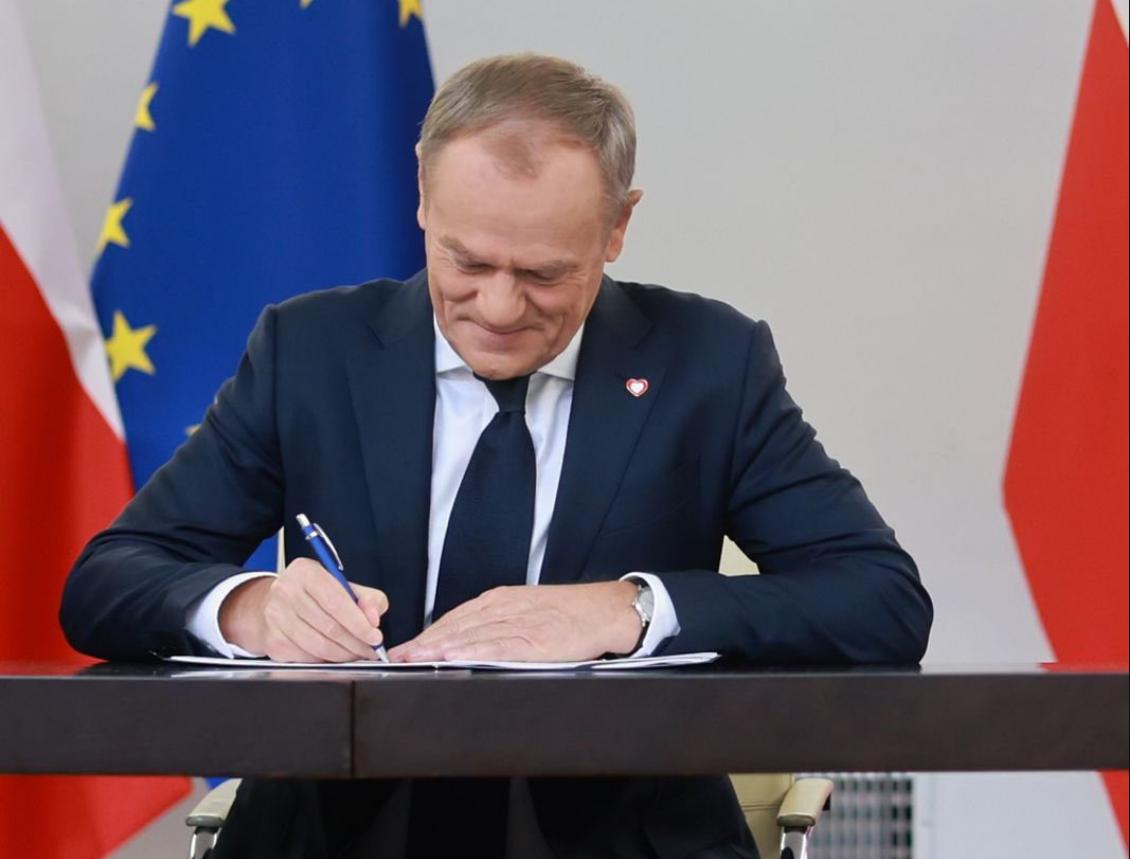
Bitter fights are emerging over civil union legislation in the governing coalitions that run Poland and Lithuania, with left-leaning parties insisting on improving the legal rights of LGBTQ couples and families, while more conservative parties want to maintain the status quo.
In Poland, that’s led to protracted negotiations to get a draft civil unions bill introduced, long after Prime Minister Donald Tusk’s original promise to have the law in place within his first hundred days in office. Tusk was sworn in as prime minister in December.
Tusk’s coalition includes his own centrist Civic Platform party, as well as the left-leaning Left party, and the more conservative Poland 2050 and Polish People’s Party (PSL), the latter of which mostly opposes recognizing same-sex couples. The coalition agreement left out any mention of civil unions.
The ambitious civil union bill aims to be an “all-but-marriage” type of union, complete with adoption rights, which has drawn the ire of the PSL. Negotiations within the coalition have focused on finding a way to get the PSL on board but have so far proved fruitless.
The opposition parties are even more hostile to LGBTQ rights and are not expected to support the bill in any form.
Regardless, Equalities Minister Katarzyna Kotula, who comes from the Left party and has been spearheading the bill, has given the coalition a deadline of the end of June to come to agreement. Failing that, she says she’ll introduce the bill without government support, although that will likely doom it to fail.
A last-ditch negotiation among the coalition partners is expected to take place June 17.
Tusk has struggled to introduce other promised social reforms since taking office. A promised hate crimes and hate speech bill has yet to be introduced. In March, the president, who comes from the conservative opposition Law and Justice Party, vetoed a bill to legalize the morning-after contraception pill.
Duda has not yet revealed if he will veto a civil union bill. The coalition does not have a three-fifths majority in parliament to override a veto.
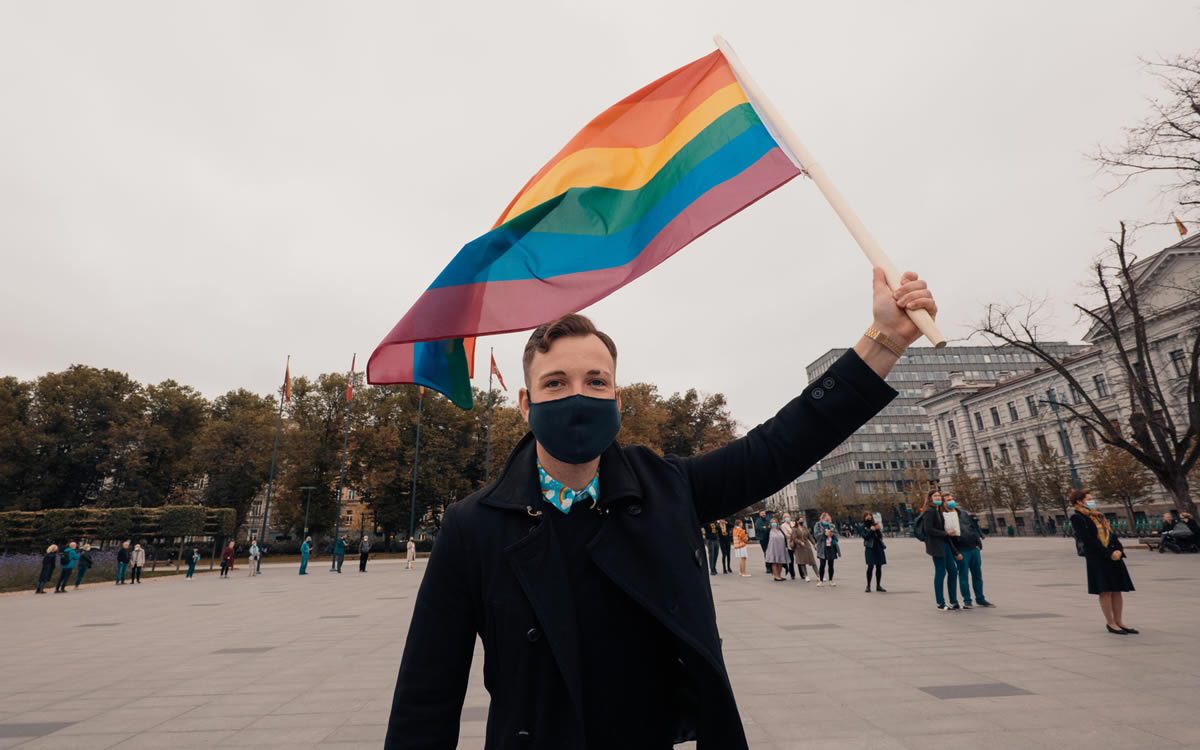
In neighboring Lithuania, tensions over a long-stalled civil union bill erupted into a dispute between coalition partners this week.
The left-leaning Freedom Party has threatened not to support the nomination of Foreign Affairs Minister Gabrielias Landsbergis to the post of European commissioner, given his party’s lack of support for the civil union bill that awaits a third a final vote in parliament.
The dispute has spilled a lot of ink in Lithuanian press, with the coalition partners debating whether or not the threat was appropriate in the circumstances.
Lithuania heads to the polls in October for parliamentary elections.
GREECE
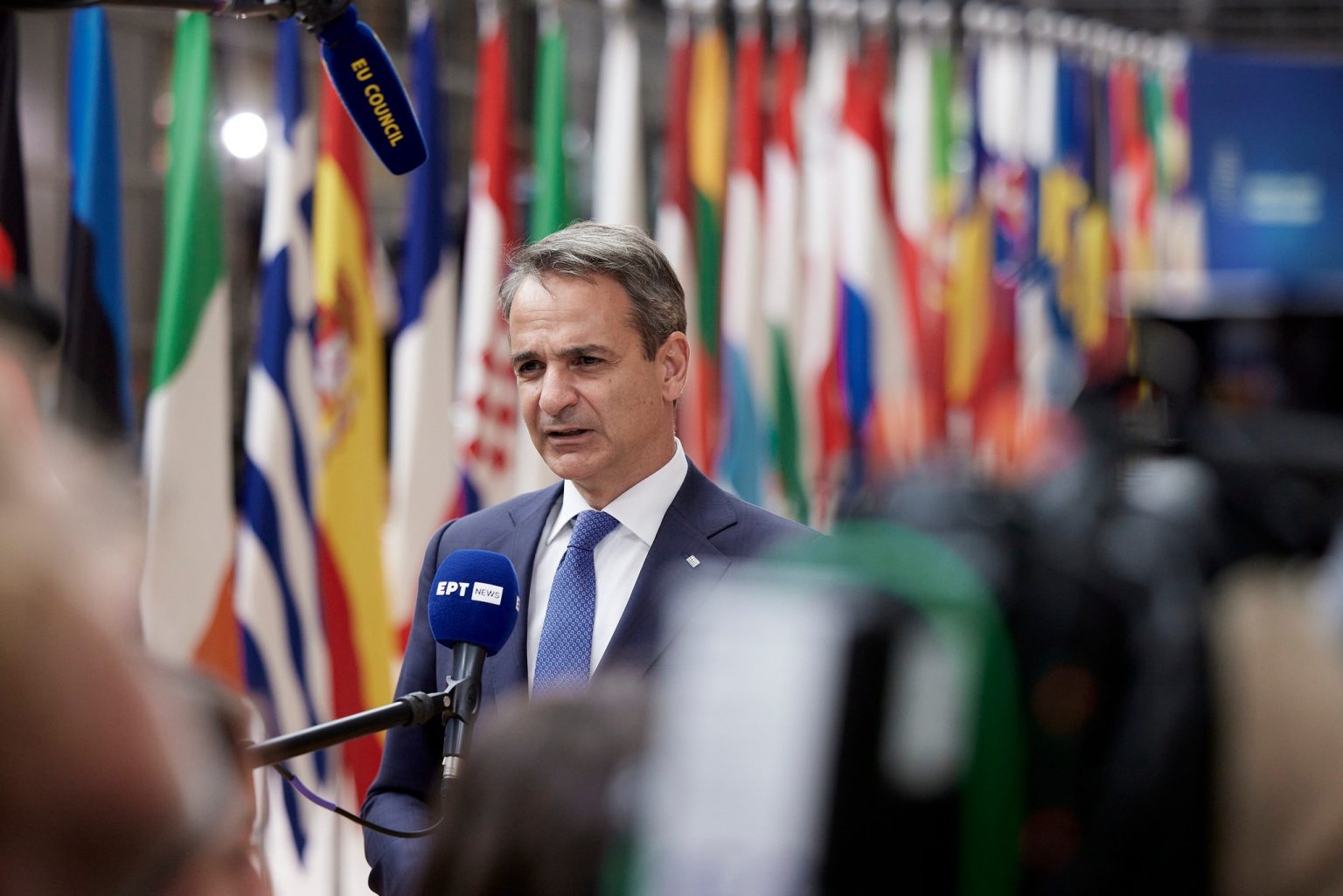
After his party took a drubbing in EU elections last weekend, Greek Prime Minister Kyriakos Mitsotakis says he is going to pause pushing forward new LGBTQ rights legislation, suggesting the new priority is changing minds rather than laws.
Mitsotakis announced his surprise support for same-sex marriage and adoption rights last year after clinching reelection, and his government passed a marriage bill in February.
But in last week’s EU elections, his party’s support dropped nearly five percentage points, while the more radical far-right Greek Solution and the anti-LGBTQ conservative NIKI party collectively gained about 10 percentage points.
Mitsotakis himself speculated to Bloomberg TV that the new same-sex marriage and adoption law passed this year alienated his party’s traditionally conservative base.
Greece is already one of the highest-scoring countries on ILGA-Europe’s Rainbow Map Index, thanks in large part to reforms that Mitsotakis himself ushered in. In addition to same-sex marriage and adoption, his government has banned conversion therapy, banned unnecessary surgeries on intersex children, and set up a National Strategy for the Equality of LGBTQI+ People.
Queer activists in Greece were still calling on the government to facilitate legal surrogacy and automatic parental recognition for same-sex couples, and a simplified process for transgender people to update their legal gender.
FRANCE

The far-right National Rally party is campaigning on restricting LGBTQ rights in snap parliamentary elections, with prime minister candidate Jordan Bardella supporting restrictions on surrogacy and IVF for same-sex couples.
French President Emmanuel Macron announced snap parliamentary elections after his party’s poor showing in the European Parliamentary elections last weekend. National Rally won the most votes in that election and is polling strongly ahead of the June 30 first-round vote. However, French elections are run in a two-round system, and National Rally often fails to win second-round votes as voters coalesce around a less unappealing compromise candidate to block them.
In the past, National Rally has campaigned strongly against LGBTQ rights, especially same-sex marriage, but they appear to have conceded that marriage equality is settled law.
While campaigning ahead of the EU elections, Bardella appeared on the French television show “Le Grand Oral”, where he reiterated his opposition to surrogacy.
Bardella also bitterly opposed Macron’s 2019 law which finally allowed lesbians to have access to in-vitro fertilization.
He told local television at the time, “There is no right to having children. Children have a right to have a father and a mother and this law creates children without fathers.”
National Rally’s opposition to same-sex parenting mirrors that of Italy’s far-right Prime Minister Giorgia Meloni, under whose watch the Italian government has stripped parental recognition from same-sex couples and imposed criminal penalties on Italians who conceive children via surrogacy.
The first week of the truncated election has taken a number of surprising turns. The mainstream right-wing party, the Republicans, has been in turmoil since its president announced his party would consider a coalition with the National Rally, which led party members to oust him and an embarrassing schism where he barricaded himself in the party headquarters and took over the party’s social media.
And in a bit of news that may be a little on-the-nose, the National Rally has nominated a man named Guillaume Bigot as their candidate in Belfort in northeastern France.
PAKISTAN
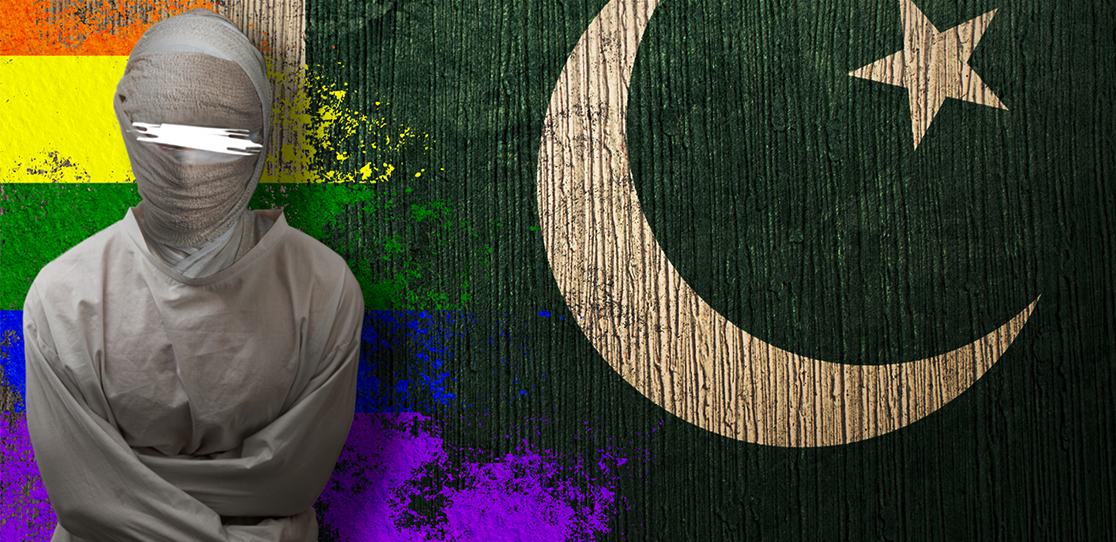
A Pakistani man was apparently committed to a mental hospital after he attempted to open a gay bar in Abbottabad, Pakistan, this month.
The man, whose identity has not been disclosed, had apparently hoped to open the country’s first gay bar in the city of 250,000 people, about 75 miles north of Islamabad.
Abbottabad is best known in the west as the city where Osama bin Laden was found and killed by U.S. Forces in 2011.
According to the Telegraph newspaper, the man had applied to open “Lorenzo Gay Club,” which he described in his application to civic authorities for a “No Objection Certificate” as a “great convenience and resource for many homosexual, bisexual and even some heterosexual people residing in Abbottabad in particular, and in other parts of the country in general.”
The application, dated May 8, also insisted that “there would be no gay (or non-gay) sex (other than kissing)” and that a notice would be posted on the wall to warn against “sex on premises.”
The applicant describes the club as “a matter of the basic human right of free association, as established in the constitution.”
Gay sex is illegal in Pakistan, which is an officially Islamic republic. A conviction would carry up to two years in prison, but the law is rarely applied as it is difficult for anyone to be openly gay in the strictly conservative country.
The application sparked considerable debate online, after a copy of the application was released to the local media. The application seen in the “Pakistan Observer” is signed by a Preetum Giani, but it is not clear if that is the applicant or a representative.
According to the Telegraph, the man was committed to the Sarhad Hospital for Psychiatric Diseases in Peshawar on May 9, and friends have been unable to reach him since. Friends who spoke to the newspaper say they are worried about his safety, but also worried for their own safety if they speak out.
The Telegraph also reports that far-right politicians in Pakistan had threatened violence and arson against the club if it had been allowed to open.
The applicant had previously told the paper that he believed it was important to stand for human rights, and that he would defend the right to open the club in the courts, in hopes that Pakistan’s courts would follow neighboring India’s lead, where gay sex was decriminalized in 2018.
SINGAPORE

A new Ipsos poll has revealed a slight majority of Singaporeans support laws banning anti-LGBTQ discrimination, and support legal recognition of same-sex couples and adoption.
The poll found that 54 percent of respondents agreed that same-sex couples should have the right to marry, and 57 percent agree they should have the right to adopt, compared to only 25 percent who oppose same-sex marriage and 30 percent who oppose same-sex couple adoption rights.
On both questions, a large number of respondents were unsure or had no opinion.
An even larger number of respondents supported anti-discrimination protections for LGBTQ people. Nearly three-quarters of respondents said that LGBTQ people should have discrimination protections in employment and housing, although only 40 percent supported legislation to that effect, while 20 percent opposed it, and another 40 percent were unsure.
There are no specific anti-discrimination laws protecting LGBTQ people in Singapore.
The poll found strongest support for LGBTQ rights among younger respondents as compared to older generations.
Two years ago, Singapore repealed a colonial-era law that criminalized gay sex. But at the same-time, parliament also amended the constitution to require parliamentary approval for same-sex marriage.
These poll numbers may indicate that eventual legalization could be possible.
Africa
LGBTQ groups question US health agreements with African countries
Community could face further exclusion, government-sanctioned discrimination

Some queer rights organizations have expressed concern that health agreements between the U.S. and more than a dozen African countries will open the door to further exclusion and government-sanctioned discrimination.
The Trump-Vance administration since December has signed five-year agreements with Kenya, Uganda, and other nations that are worth a total of $1.6 billion.
Kenyan and Ugandan advocacy groups note the U.S. funding shift from NGO-led to a government-to-government model poses serious risks to LGBTQ people and other vulnerable populations in accessing healthcare due to existing discrimination based on sexual orientation.
Uganda Minority Shelters Consortium, Let’s Walk Uganda, the Kenya Human Rights Commission, and the Center for Minority Rights and Strategic Litigation note the agreements’ silence on vulnerable populations in accessing health care threatens their safety, privacy, and confidentiality.
“Many LGBTQ persons previously accessed HIV prevention and treatment, sexual and reproductive health services, mental health support, and psychosocial care through specialized clinics supported by NGOs and partners such as USAID (the U.S. Agency for International Development) or PEPFAR,” Let’s Walk Uganda Executive Director Edward Mutebi told Washington Blade.
He noted such specialized clinics, including the Let’s Walk Medical Center, are trusted facilities for providing stigma-free services by health workers who are sensitized to queer issues.
“Under this new model that sidelines NGOs and Drop-in Centers (DICs), there is a high-risk of these populations being forced into public health facilities where stigma, discrimination, and fear of exposure are prevalent to discourage our community members from seeking care altogether, leading to late testing and treatment,” Mutebi said. “For LGBTQ persons already living under criminalization and heightened surveillance, the loss of community-based service delivery is not just an access issue; it is a full-blown safety issue.”
Uganda Minority Shelters Consortium Coordinator John Grace said it is “deeply troubling” for the Trump-Vance administration to sideline NGOs, which he maintains have been “critical lifelines” for marginalized communities through their specialized clinics funded by donors like the Global Fund and USAID.
USAID officially shut down on July 1, 2025, after the White House dismantled it.
Grace notes the government-to-government funding framework will impact clinics that specifically serve the LGBTQ community, noting their patients will have to turn to public systems that remain inaccessible or hostile to them.
“UMSC is concerned that the Ugandan government, under this new arrangement, may lack both the political will and institutional safeguards to equitably serve these populations,” Grace said. “Without civil society participation, there is a real danger of invisibility and neglect.”
Grace also said the absence of accountability mechanisms or civil society oversight in the U.S. agreement, which Uganda signed on Dec. 10, would increase state-led discrimination in allocating health resources.
Center for Minority Rights and Strategic Litigation Legal Manager Michael Kioko notes the U.S. agreement with Kenya, signed on Dec. 4, will help sustain the country’s health sector, but it has a non-binding provision that allows Washington to withdraw or withhold the funding at any time without legal consequences. He said it could affect key health institutions’ long-term planning for specialized facilities for targeted populations whose independent operations are at stake from NGOS the new agreement sidelines.
“The agreement does not provide any assurance that so-called non-core services, such as PrEP, PEP, condoms, lubricants, targeted HIV testing, and STI prevention will be funded, especially given the Trump administration’s known opposition to funding these services for key populations,” Kioko said.
He adds the agreement’s exclusionary structure could further impact NGO-run clinics for key populations that have already closed or scaled down due to loss of the U.S. funding last year, thus reversing hard-won gains in HIV prevention and treatment.
“The socio-political implications are also dire,” Kioko said. “The agreement could be weaponized to incite discrimination and other LGBTQ-related health issues by anti-LGBTQ voices in the parliament who had called for the re-authorization of the U.S. funding (PEPFAR) funding in 2024, as a political mileage in the campaign trail.”
Even as the agreement fails to safeguard specialized facilities for key populations, the Kenya Human Rights Commission states continued access to healthcare services in public facilities will depend on the government’s commitment to maintain confidentiality, stigma-sensitive care, and targeted outreach mechanisms.
“The agreement requires compliance with applicable U.S. laws and foreign assistance policies, including restrictions such as the Helms Amendment on abortion funding,” the Kenya Human Rights Commission said in response to the Blade. “More broadly, funded activities must align with U.S. executive policy directives in force at the time. In the current U.S. context, where executive actions have narrowed gender recognition and reduced certain transgender protections, there is a foreseeable risk that funding priorities may shift.”
Just seven days after Kenya and the U.S. signed the agreement, the country’s High Court on Dec. 11 suspended its implementation after two petitioners challenged its legality on grounds that it was negotiated in secrecy, lacks proper parliamentary approval, and violates Kenyans’ data privacy when their medical information is shared with America.
The agreement the U.S. and Uganda signed has not been challenged.
European Union
European Parliament resolution backs ‘full recognition of trans women as women’
Non-binding document outlines UN Commission on the Status of Women priorities

The European Parliament on Feb. 12 adopted a transgender-inclusive resolution ahead of next month’s U.N. Commission on the Status of Women meeting.
The resolution, which details the European Union’s priorities ahead of the meeting, specifically calls for “the full recognition of trans women as women.”
“Their inclusion is essential for the effectiveness of any gender-equality and anti-violence policies; call for recognition of and equal access for trans women to protection and support services,” reads the resolution that Erin in the Morning details.
The resolution, which is non-binding, passed by a 340-141 vote margin. Sixty-eight MPs abstained.
The commission will meet in New York from March 10-21.
A sweeping executive order that President Donald Trump signed shortly after he took office for a second time on Jan. 20, 2025, said the federal government’s “official policy” is “there are only two genders, male and female.” The Trump-Vance administration has withdrawn the U.S. from the U.N. LGBTI Core Group, a group of U.N. member states that have pledged to support LGBTQ and intersex rights, and dozens of other U.N. entities.
India
Trans students not included in new India University Grants Commission equity rules
Supreme Court on Jan. 29 delayed implementation

The University Grants Commission is a regulatory body under India’s Education Ministry that is responsible for coordinating and maintaining standards in higher education. The University Grants Commission Equity Regulations, 2026, aim to address discrimination and promote the inclusion of lower castes, tribes, people with disabilities, those who are economically disadvantaged, and other marginalized groups in higher education.
The regulations quickly triggered controversy.
Students, faculty and civil society groups criticized them, largely around concerns about potential discrimination against students and the absence of certain procedural safeguards. Yet, even as the debate intensified, there was little public discussion about the lack of explicit mention of transgender students in the framework. The omission, though not central to the overall controversy, raised questions among some advocates about the scope of the regulations and who they ultimately protect.
According to the All India Survey on Higher Education, trans student enrollment in universities and colleges rose from 302 in the 2020-2021 academic year to 1,448 in the 2022-2023 academic year, reflecting a sharp increase but still representing a very small share of India’s overall higher education population.
The Supreme Court in its 2024 National Legal Services Authority v. Union of India affirmed trans people are entitled to full constitutional protection, including equality, dignity and access to education, and directed governments to treat them as a socially and educationally disadvantaged group eligible for quota-based protections in education and public employment. The ruling recognized gender identity as integral to personal autonomy and held that discrimination on this ground violates fundamental rights under Articles 14, 15, 16, and 21.
Against this legal backdrop, the regulations do not explicitly reference trans students, an omission that has drawn attention in discussions on how constitutional protections are implemented within higher education institutions.
In the Indian constitutional framework, Articles 14, 15, 16, and 21 collectively form the foundation of equality and personal liberty.
Article 14 guarantees equality before the law and equal protection of laws; Article 15 prohibits discrimination on grounds such as religion, race, caste, sex or place of birth; Article 16 ensures equality of opportunity in public employment; and Article 21 protects the right to life and personal liberty, which courts have interpreted to include dignity, autonomy, and access to education. These provisions underpin judicial recognition of protections for marginalized communities, including trans people, within public institutions.
Judicial and policy frameworks in India have increasingly recognized the need for institutional support for trans students, underscoring the contrast with the absence of explicit mention in the University Grants Commission Equity Regulations, 2026, regulations.
The Madras High Court has directed educational institutions to implement measures such as gender-neutral restrooms, mechanisms to update name and gender in official records, inclusion of trans identities in application forms and the appointment of LGBTQ-inclusive counselors for grievance redressal alongside enforcement of the Transgender Persons (Protection of Rights) Act and its Rules.
Policy instruments have echoed similar priorities.
The National Youth Policy 2014 acknowledged trans youth as a group facing social stigma and called for targeted interventions, while the National Education Policy 2020 emphasized reducing dropout rates and ensuring equitable access to education. The University Grants Commission itself has previously indicated that universities should adopt affirmative steps and institution-specific plans to support trans people, making their absence from the current regulatory text more pronounced.
Research and policy analyses have consistently documented structural barriers faced by trans students in India’s education system. The Center for Development Policy and Practices and other academic studies note that discrimination, bullying, and the absence of gender-sensitive infrastructure contribute to high dropout risks among trans students in both school and higher education. Census data underscore this disparity.
The 2011 Census recorded a literacy rate of about 56.1 percent among trans people, significantly lower than the national average of roughly 74 percent, reflecting long-standing barriers to access and retention in formal education.
The controversy intensified after the Supreme Court on Jan. 29 stayed the implementation of the University Grants Commission Equity Regulations, 2026, and agreed to examine their constitutional validity.
A bench led by Chief Justice Surya Kant observed the regulations raised serious legal questions, including concerns that some provisions appeared vague and potentially open to misuse, and sought responses from the federal government and the University Grants Commission. The court directed that the earlier 2012 anti-discrimination framework would remain in force in the interim and listed the matter for further hearing, signalling the need for detailed judicial scrutiny.
Public and political reactions followed, with student groups, academics, and political actors divided over the stay and the broader policy direction. The federal government, led by Prime Minister Narendra Modi, maintained the regulations were intended to address caste-based discrimination and strengthen accountability within higher education institutions even as debate intensified nationally.
The regulations go beyond paperwork. They require universities to create on-campus equity monitoring teams and designated officers responsible for identifying incidents of discrimination, receiving complaints and reporting them to institutional committees for action. However, while the framework spells out protections for certain caste and social categories, it does not explicitly include trans students within this structure. In practice, that absence could leave uncertainty about whether routine monitoring, reporting and grievance mechanisms would extend to them with the same clarity, particularly in campuses where implementation already varies widely.
The regulations also prescribe penalties for faculty and staff found responsible for discrimination, including suspension, withholding of promotions, or termination of service following institutional inquiry. For students, disciplinary action may range from warnings to suspension depending on the severity of the misconduct. Where an incident amounts to a violation of existing statutory or criminal law, institutions are required to refer the matter to law enforcement authorities, placing responsibility on universities to escalate cases beyond internal mechanisms when warranted.
The regulations do not create new criminal offences but require institutions to escalate cases to law enforcement when conduct violates existing statutes. These may include the Scheduled Castes and Scheduled Tribes (Prevention of Atrocities) Act, relevant provisions of the country’s penal code, such as criminal intimidation, assault or sexual harassment, disability rights protections, workplace harassment laws, and statutes addressing campus hazing. The framework is therefore stringent: campus inquiries can lead to disciplinary action, and, where legal thresholds are met, mandatory reporting to police. In the absence of explicit mention of trans students within the framework, questions remain about how individuals from the community would navigate complaint systems, interact with authorities, and access consistent institutional protections under these processes.
The Scheduled Castes and Scheduled Tribes (Prevention of Atrocities) Act, 1989 is among India’s strictest anti-discrimination criminal laws and applies to students, staff and any individual accused of caste-based offences. It criminalizes acts such as intentional insults or humiliation, social exclusion, threats, physical assault and other forms of harassment directed at members of specific castes or tribes. Offenses under the law can lead to arrest, non-bailable charges in several categories, and imprisonment that may extend from months to years depending on the severity of the conduct, along with fines. The law also restricts anticipatory bail in many cases and mandates prompt registration of complaints, which is why it is often viewed as a powerful legal safeguard for marginalized communities while also being regarded by some as carrying serious legal consequences once invoked.
Nishikant Dubey, a member of India’s ruling Bharatiya Jana Party, welcomed the Supreme Court’s decision to stay the regulations, stating the judges had acted appropriately and that the matter required careful legal scrutiny. Indrani Chakraborty, an LGBTQ rights activist and mother of a trans woman, told the Washington Blade the University Grants Commission Equity Regulations, 2026, is a welcome step toward supporting vulnerable students.
“The saddest part is that the transgender community is excluded which is very unfair,” said Chakraborty. “Presently, the transgender community is the most vulnerable and not mentioning the community in the act. I regard it as the biggest discrimination and will never help in changing the scenario of the transgender students.”
Chakraborty told the Blade the trans community, as a minority facing persistent social stigma and taboo, is often overlooked and must repeatedly advocate even for basic rights.
“I believe that grouping of individuals under caste, religion, gender, etc., is the base of discrimination. Personally, I disagree with naming and tagging any individual. Equity over equality is the need now for the most vulnerable. And the transgender community faces discrimination the most. Discrimination against any individual in educational institutions needs immediate attention and preventive measures should be necessarily implemented.”
Chakraborty said the absence of explicit inclusion of trans students amounts to discrimination, undermining equality in education and violating human dignity.
Ankit Bhupatani, a global diversity, equity and inclusion leader and LGBTQ activist, told the Blade that debate around the University Grants Commission Equity Regulations, 2026, has largely centered on concerns raised by relatively privileged students, particularly those in the unreserved category, while communities with limited visibility in higher education have received far less attention. Bhupatani also referenced the All India Survey on Higher Education statistics.
“According to Queerbeat, more than half of these 1,448 students are clustered in a few states and several large states still report almost no transgender students at all. Any serious equity regime has to guard every individual, including upper-caste students who are unfairly targeted or stereotyped , but the public conversation cannot pretend this tiny, highly vulnerable group does not exist,” said Bhupatani. “When outrage dominates headlines and the most marginalized are barely mentioned, the word ‘equity’ starts to lose meaning.”
Bhupatani told the Blade that the University Grants Commission Equity Regulations, 2026, define gender to include the “third gender” and prohibit discrimination on that basis, but then repeatedly identify lower castes, tribes, economically disadvantaged groups, people with disabilities, and women as specific groups, while trans students and teachers are not explicitly listed. Bhupatani said that for a young trans person reading the regulations, the message can feel indirect — that others are clearly recognized while their protections depend on interpretation. He added that explicitly naming trans people as a protected group would not dilute safeguards for others, but would instead ensure those already facing stigma are not left to seek recognition case by case.
“Transgender people sit at the intersection of legal vulnerability and social prejudice, so if they are not named and centered in large regulatory exercises, they quickly disappear from view,” said Bhupatani. “Campus rules need to start with a simple moral intuition. No one, whether Dalit or Brahmin, trans or cis, rich or poor, should be harassed, excluded or denied opportunity because of who they are. The University Grants Commission (Promotion of Equity in Higher Education Institutions) Regulations, 2026 already move in this direction by defining discrimination broadly for all students and staff and by listing grounds such as caste, gender, religion, disability, and place of birth. That universal shift is essential.”
Bhupatani said a fair equity framework should operate on two levels. First, it must guarantee that any individual, regardless of background, can seek redress if treated unfairly. Second, it should explicitly identify groups that face entrenched barriers — including lower castes and tribes, people with disabilities, and trans people — and build specific safeguards for them. He added that concerns about misuse could be addressed through clearer definitions, transparent procedures, trained inquiry committees, representation from diverse groups, and meaningful penalties for false or malicious complaints.
Kalki Subramaniam, a trans activist and artist, told the Blade that trans students face layered vulnerabilities — including social stigma, harassment, and systemic neglect — that often go unaddressed on campuses. When policies do not explicitly name them, she said, it signals that their struggles are not seen as warranting recognition, reinforcing isolation, and undermining their ability to access safe and dignified education.
“I have faced this and I really do not want this generation of transgender students to go through the same kind of exclusion and treatment,” said Subramaniam. “If the government truly believes in inclusive education, transgender students must be explicitly recognised in every policy conversation. Otherwise, we remain erased from the very spaces that claim to be suitable. We will certainly urge the government to ease and prioritise education for transgender community students.”
Subramaniam said limiting protections primarily to caste categories reflects a narrow approach to justice, noting that discrimination on campuses can also be shaped by gender, class, disability, and sexuality. She said a more expansive framework would protect any student facing discrimination, regardless of identity, and emphasized that equity must operate universally for campuses to function as spaces of learning rather than exclusion.
-

 State Department4 days ago
State Department4 days agoFOIA lawsuit filed against State Department for PEPFAR records
-

 Opinions4 days ago
Opinions4 days agoTrans sports bans rooted in eugenics
-

 India4 days ago
India4 days agoTrans students not included in new India University Grants Commission equity rules
-

 New York4 days ago
New York4 days agoPride flag raised at Stonewall after National Park Service took it down




















